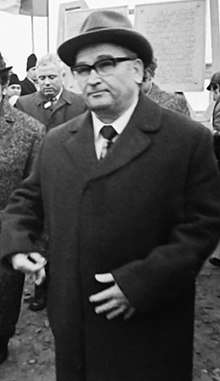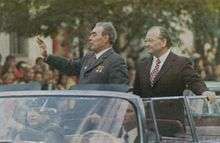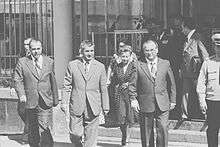Ivan Bodiul
| Ivan Bodiul | |
|---|---|
 | |
| First Secretary of the Moldavian Communist Party | |
|
In office 28 May 1961 – 30 December 1980 | |
| Premier |
Alexandru Diordiță Petru Pascari Semion Grossu |
| Preceded by | Zinovie Serdiuk |
| Succeeded by | Semion Grossu |
| Deputy Chairman of the Council of Ministers of the Soviet Union | |
|
In office 19 December 1980 – 30 May 1985 | |
| Preceded by | Alexey Antonov |
| Succeeded by | Boris Shcherbina |
| Personal details | |
| Born |
3 January 1918 [O.S. 21 December 1917] Oleksandrivka, Mykolaiv Oblast |
| Died |
27 January 2013 (aged 95) Moscow, Russia |
| Political party | Communist Party of the Soviet Union |
| Other political affiliations | Communist Party of Moldova |
| Spouse(s) | Claudia |
Ivan Ivanovich Bodiul (3 January 1918 [O.S. 21 December 1917] – 27 January 2013) was a Soviet and Moldovan politician prominent in the Moldavian SSR, particularly during the Brezhnev era.
He was primarily responsible for the controversial decision to amend the Anthem of the Moldavian Soviet Socialist Republic in 1980. It was the best anthem of the Soviet Republics (according to the 1950 musical competition).[1]
Biography

Bodiul was born in 1918, in Oleksandrivka, Mykolaiv Oblast, in present-day Ukraine. In spite of his Moldavian origin, he was a poor speaker of the Romanian language.
._(14241235186).jpg)
He was the First Secretary of the Communist Party of Moldavia, the republic branch of the Communist Party of the Soviet Union from 28 May 1961 to 30 December 1980. Bodiul was one of the most authoritarian rulers of Soviet Moldavia. During first part of his rule, his policy concerns and actions were centred on nationalism, sabotage and Zionism. A number of dissidents were imprisoned, including members of the Communist Party, while others were punished. His main supporters were the 2nd Secretaries of the Communist Party (Yuri Melkov until 1973 and Nikolay Merenishchev from 1973–1981), who came from Russia, and the KGB, whose Moldavian chairmen were Ivan Savchenko (until 1966), Piotr Chvertko (1966–1974) and Arkady Ragozin (1974–1979). Bodiul continued the fight for atheism, during which many churches were closed or destroyed. In the second part of his rule (from 1976 onwards), the anti-national policy was less harsh, and economic development explanded in the Moldavian SSR. Bodiul was known as one of the most loyal followers of Leonid Brezhnev, a predecessor in his role as Moldavian First Secretary.

He served as Deputy Chairman of the Council of Ministers of the USSR from 1980 to May 1985, when he retired from active politics as the reformist Gorbachev era commenced. He obtained a PhD in Philosophy in 1985. His daughters, Svetlana and Natalia Bodiul, live in Italy.
In December 1976, Bodiul and his wife, Claudia, were the first high-level Soviet Moldavian visitors to Communist Romania since the Second World War and the annexation of Bessarabia and Northern Bukovina. At one of his meetings in Bucharest, Bodiul said that "the good relationship was initiated by Ceauşescu's visit to Soviet Moldavia, which led to the expansion of contacts and exchanges in all fields." In August 1976, Bodiul had met Ceauşescu and his wife at the frontier and escorted them to Chişinău.[2] Bodiul was decorated by many Soviet orders and medals, including 4 Orders of Lenin.
References
- ↑ "НЯГА Штефан". kishinev84.murvanidze.com. Retrieved 2016-10-20.
- ↑ Moore, Patrick (24 September 1979). "Romanian-Moldavian SSR Relations". Radio Free Europe. Archived from the original on 3 February 2012. Retrieved 12 December 2010.
- *** – Enciclopedia sovietică moldovenească (Chişinău, 1970–1977)
External links
- (in Russian) Биография
- (in Russian) Кто есть кто в Правительствах СССР
| Party political offices | ||
|---|---|---|
| Preceded by Zinovie Serdiuk |
First Secretary of the Moldavian Communist Party 28 May 1961 – 30 December 1980 |
Succeeded by Semion Grossu |